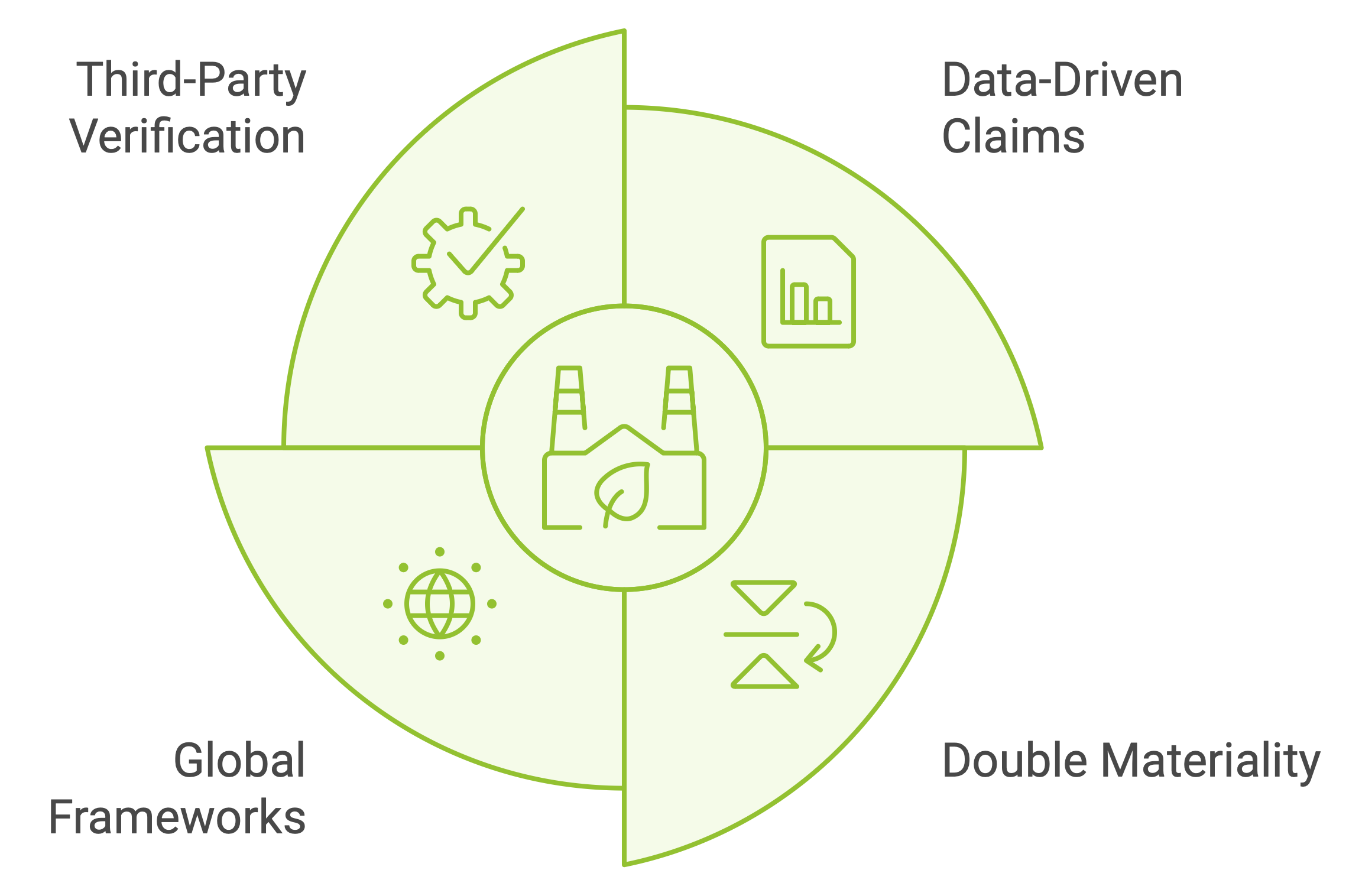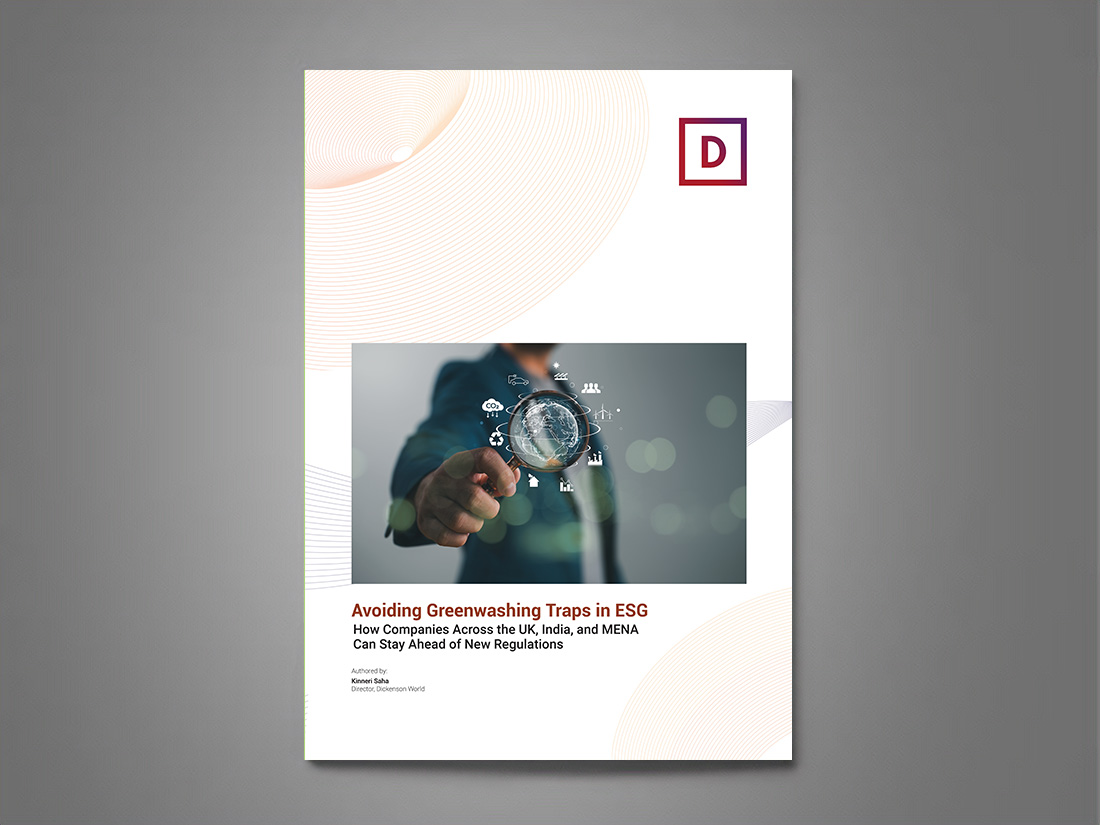Avoiding Greenwashing Traps in ESG
How Companies Across the UK, India, and MENA Can Stay Ahead of New Regulations
So, how do you avoid falling into the greenwashing trap?
How do you ensure your ESG claims are credible and compliant?
The UK’s Financial Conduct Authority (FCA) has stepped up with new anti-greenwashing rules for financial products. Companies must ensure that their ESG claims are grounded in verifiable data and consistent across all communications. Meanwhile, the EU’s Sustainable Finance Action Plan, which includes the EU Taxonomy Regulation and Sustainable Finance Disclosure Regulation (SFDR), is setting higher standards for transparency. India and MENA are also catching up, with India’s Business Responsibility and Sustainability Report (BRSR) and MENA’s growing ESG frameworks making similar demands. In a landscape that’s evolving faster than ever, your dedication to genuine ESG efforts is what will define your company’s standing today and its legacy tomorrow. Leading the charge against greenwashing isn’t just about staying compliant-it’s about shaping the future of responsible business, influencing industry standards, and driving meaningful impact across borders.
These regulations mean one thing: if your business operates across regions, your ESG claims must align with diverse, sometimes conflicting, standards. But there’s a way to navigate this complexity.
Avoiding Greenwashing Traps: A Practical Approach

-
Be Data Driven & Plan Ahead
The key is to back every ESG claim with solid evidence. Data is your ally. Whether you’re highlighting a reduction in carbon emissions or claiming sustainable sourcing practices, make sure you have the numbers and third-party validation to support it. Vague claims like “eco-friendly” or “green” without context can easily backfire. -
Be Double Materiality Sensitive
Next, take a double materiality approach. Instead of just looking at how ESG factors impact your bottom line, also consider how your operations affect society and the environment. This broader perspective not only adds depth to your reporting but also aligns with emerging global standards. For example, if you’re claiming carbon neutrality, explain how you’ve achieved this—whether through energy efficiency, renewable energy use, or offset initiatives. Showcase the tangible benefits to local communities, such as improved air quality or investments in local renewable projects. -
Global Frameworks: Your Guiding Light
Adhering to well-recognized frameworks like GRI, TCFD, and SASB provides a solid foundation. These frameworks help standardize your reporting, reducing the risk of inconsistencies. They’re also recognized internationally, making them invaluable for companies operating in the UK, India, and MENA. For instance, aligning with TCFD helps disclose climate-related risks and opportunities in a way that investors trust. Similarly, using GRI standards ensures comprehensive reporting on social and environmental impacts. This way, you meet both local and international requirements, whether it’s the EU’s SFDR or India’s BRSR. -
The Value of Third-Party Verification
Getting external validation adds weight to your ESG claims. Certifications like B Corp, Fair Trade, or compliance with ISO 14001 for environmental management are more than badges-they’re proof of your commitment. Third-party certifications show that your sustainability efforts aren’t just self-proclaimed but meet established industry standards. Take Unilever, for example. Its Sustainable Living Plan involves certification from bodies like Rainforest Alliance and RSPO (Roundtable on Sustainable Palm Oil). This adds credibility to its ESG communications, strengthening its position as a leader in sustainability.
What This Means for You: Building a Legacy of Credibility and Trust
For CFOs, IROs, and Company Secretaries, staying ahead of greenwashing regulations is not just a compliance exercise—it’s a strategic imperative. In an environment where stakeholders are becoming increasingly sceptical of superficial claims, your role in shaping the company’s ESG narrative has never been more critical. Transparent, data-driven ESG claims are more than a defence against regulatory scrutiny; they are a competitive advantage that differentiates your business in the eyes of investors, customers, and partners.

Adopting a proactive approach to ESG reporting means positioning your company as a leader in sustainable practices, irrespective of geographic boundaries-be it the UK, India, or MENA. By embedding authenticity and rigor into every aspect of your ESG strategy, you not only mitigate the risk of greenwashing but also build a legacy of credibility that transcends market cycles and regulatory shifts.
The stakes are high, and the opportunity is greater. Those who take the lead in aligning with global standards, leveraging third-party validation, and embracing a double materiality lens will not just comply with regulations-they will set the benchmark
for responsible corporate behaviour. This commitment to transparency and accountability is what ultimately earns the trust of stakeholders, reinforces your brand’s reputation, and secures long-term value for the business.
Contact Us: To learn more or schedule a consultation, please reach out to us at www.dickensonworld.com
enquiry@dickensonworld.com.

Avoiding Greenwashing Traps in ESG
To download and save this article.
Authored by:
Kinneri Saha
Director, Dickenson World
Visit www.dickensonworld.com to learn more about our services and how we can help streamline your corporate reporting process.

Leave A Comment